When you think of staying hydrated, odds are you picture water or a drink that’s chuck full of electrolytes. But have you ever opened your fridge and wondered if almond milk is good for hydration?
Almond milk is a hydrating beverage as its mostly composed of water. Fortified variations will contain small amounts of key electrolytes like calcium, sodium, and potassium that help you stay hydrated.
This article will teach you everything you need to know about hydration and how almond milk can help you keep your body well hydrated.
Why Almond Milk Helps with Hydration
When it comes to staying hydrated, it’s important to have a healthy balance of water and electrolytes. Almond milk will generally deliver on both fronts making it a relatively good option for hydration.
Almond milk primarily helps with hydration as its primary ingredient is water. Approximately 98% of almond milk is water making it almost as good as plain old water for hydration.
Depending on how the almond milk is formulated, it may also contain sodium (salt). Sodium has been shown to be a critical electrolyte involved in maintaining hydration levels in the human body.
Another electrolyte that is present in the almond milk is potassium. Potassium works hand in hand with sodium to help maintain adequate levels of water in cells to help all of your bodily functions.
If your almond milk comes fortified with calcium (e.g. calcium carbonate or tricalcium phosphate), this may also help your overall hydration.
Calcium has been shown to play a key role in keeping the balance of electrolytes in the human body.
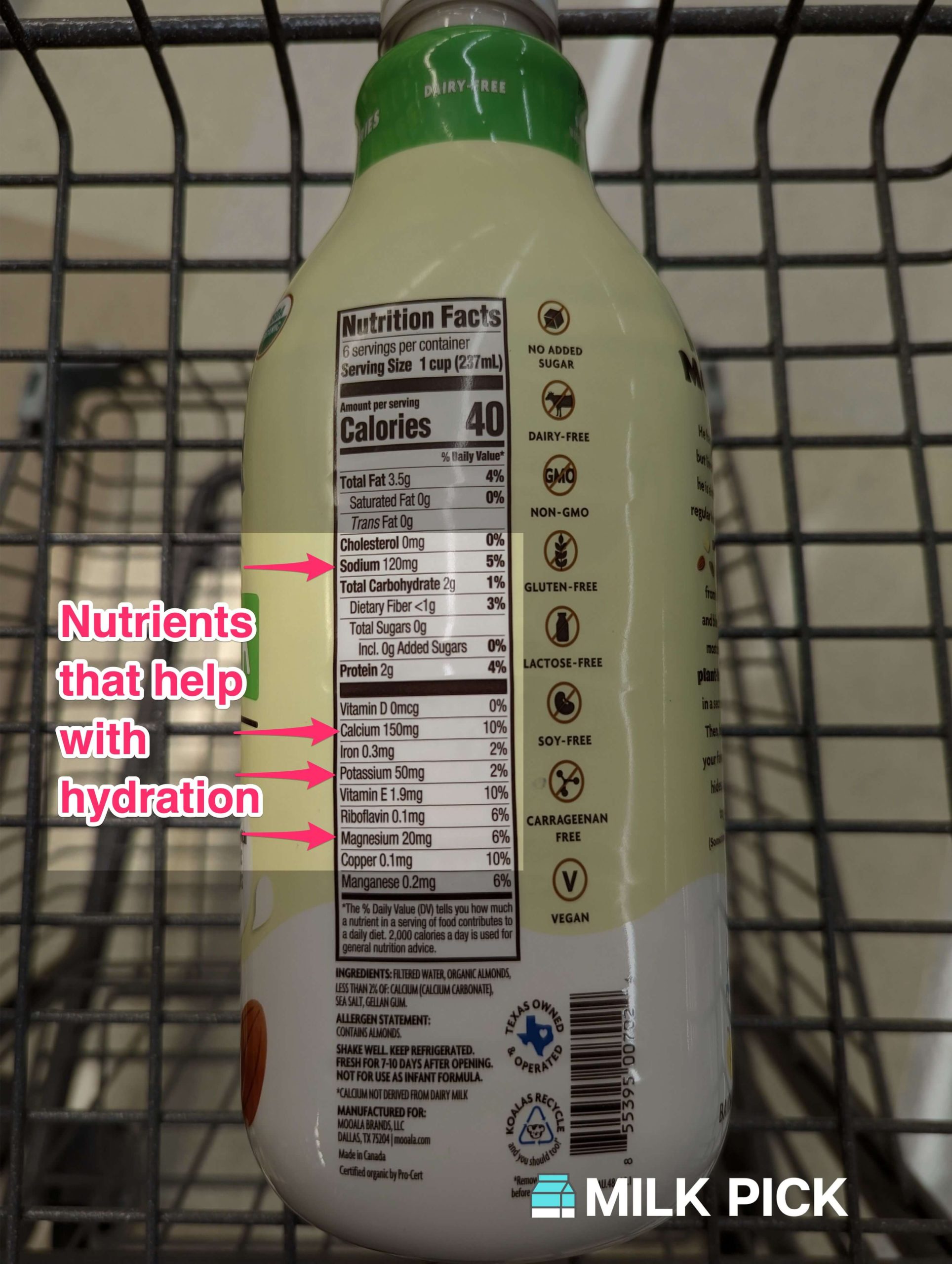
What Does It Mean to Be Well Hydrated?
In order to understand why almond milk is hydrating, it’s important to first understand hydration. Hydration essentially means you have a good balance of water and electrolytes in your body that allows you to perform physiological processes.
As humans, we tend to lose water throughout the day when we sweat, breathe, and go to the bathroom. These fluids need to be replaced throughout the day to assure that our body has enough water to function.
Research shows that poor hydration can lead to kidney dysfunction, neurological issues, gut problems, and make it more difficult to manage your weight.
But it’s not just water that’s key for hydration. You can drink all the water in the world, but without electrolytes your body will not maintain that water.
Some of the key electrolytes when it comes to hydration are sodium, potassium, chloride, calcium, phosphate, and magnesium.
When it comes to staying hydrated, you want beverages that contain both water and adequate amounts of these electrolytes if possible.
Water and Almond Milk
We all know that water plays a big role when it comes to staying hydrated. Without water, your body will not function appropriately.
Research recommends that men get at least 3,000 milliliters and women 2,200 milliliters of water daily to stay hydrated.
This comes out to about 101 ounces for men and 74 ounces for women. This is more than the recommended 8 eight-ounce glasses.
This number will also increase if you are more physically active. All this to say, you need to be consuming a lot of water each day to stay adequately hydrated.
Almond milk can help you out as it is composed of 98% water.
Having a cup or two of almond milk a day or adding it into your smoothies may make it a bit easier to get in your total daily water consumption to keep yourself hydrated.
This is not to say that all your hydration should come from almond milk alone.
It’s important that the bulk of your hydration comes from plain water each day for your overall health.
Sodium and Almond Milk
It’s obvious that water is important when it comes to hydration, but you may not realize that sodium is just as important.
Sodium is an electrolyte that helps your body absorb and retain the water you ingest.
Drinks that contain adequate amounts of sodium balanced with water have been found to be more hydrating that water alone.
Most commercial almond milks contain salt, so this in combination with the high water content make it a fairly hydrating beverage.
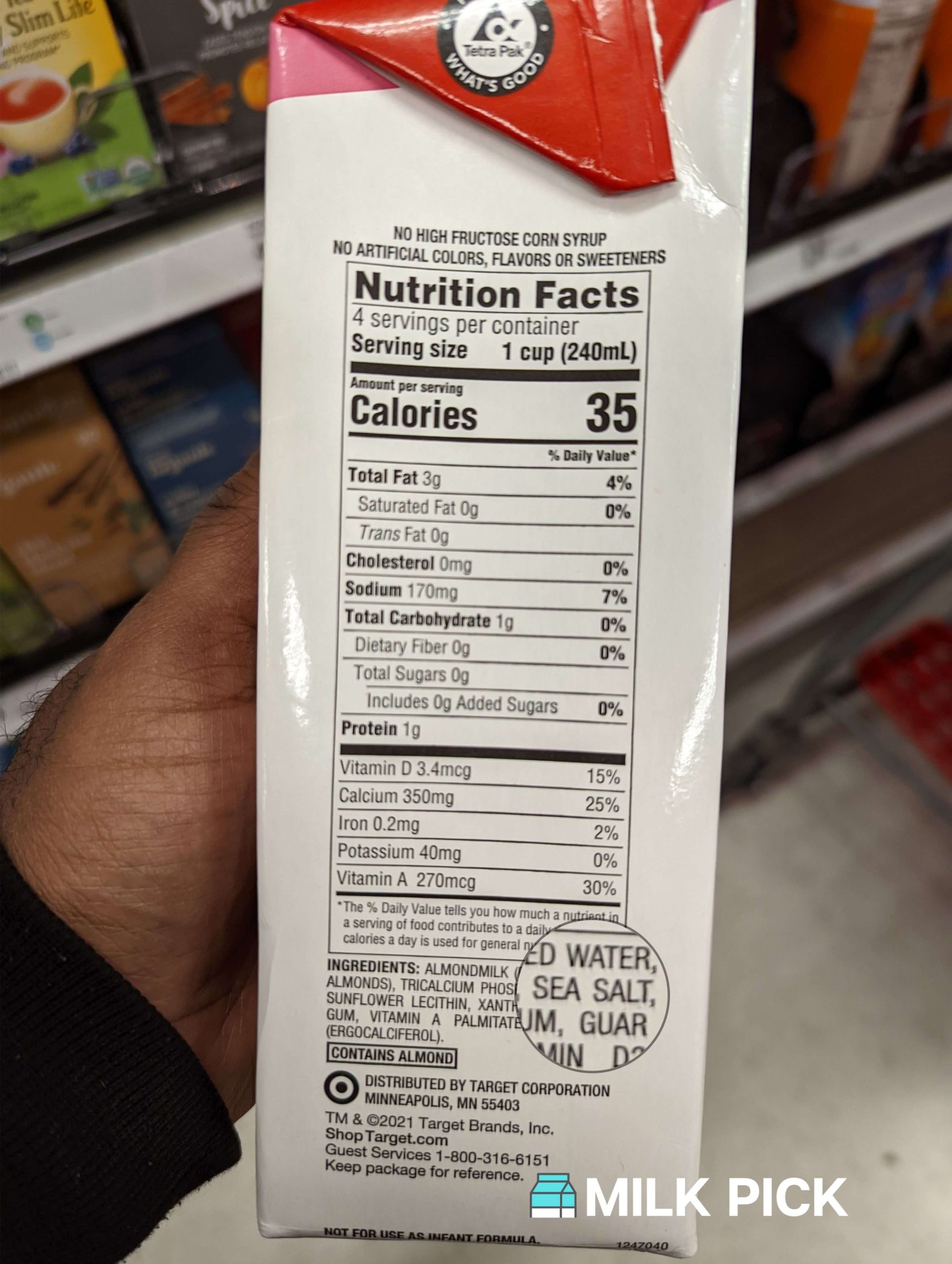
Depending on how the almond milk is made it may contain 100 to 200 milligrams per eight ounce serving.
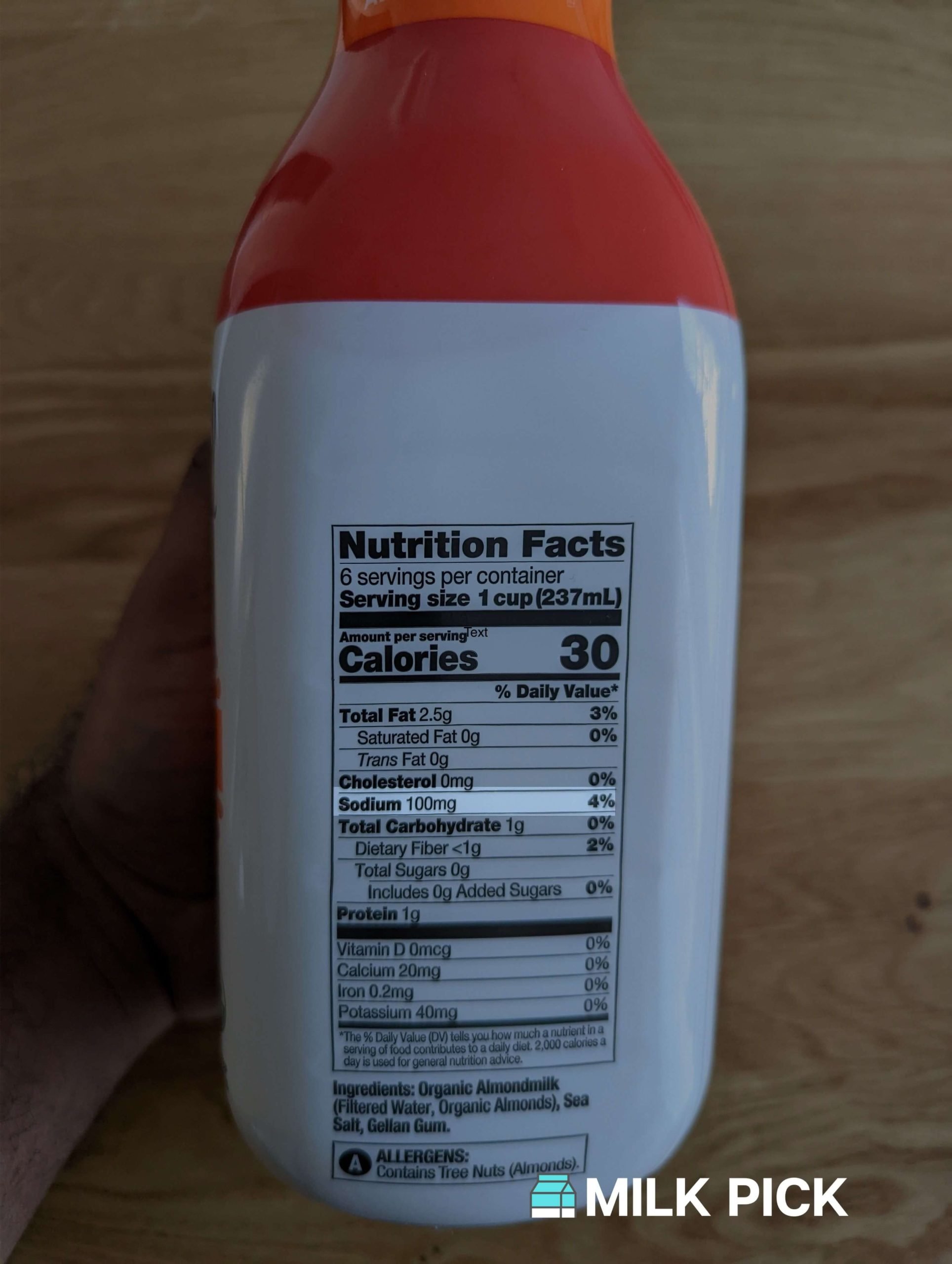
The FDA recommends not consuming more than 2,300 milligrams of sodium per day, so a few glasses of almond milk are well below this limit.
However, consider if you are already getting enough salt in your diet without almond milk to stay hydrated.
This is especially important if you struggle with high blood pressure because consuming too much salt can cause issues.
Potassium and Almond Milk
Another key electrolyte when it comes to hydration is potassium. Like sodium, studies show that potassium helps your body get the water into the cells and better maintain it.
Almond milk does contain potassium naturally as almonds have potassium in them.
However, many commercial almond milk brands don't contain many almonds, which makes them lower in potassium.
One brand we've found with the highest levels of natural potassium is Elmhurst, which only contains two ingredients—filtered water and almonds.
Elmhurst contains 160mg of potassium.
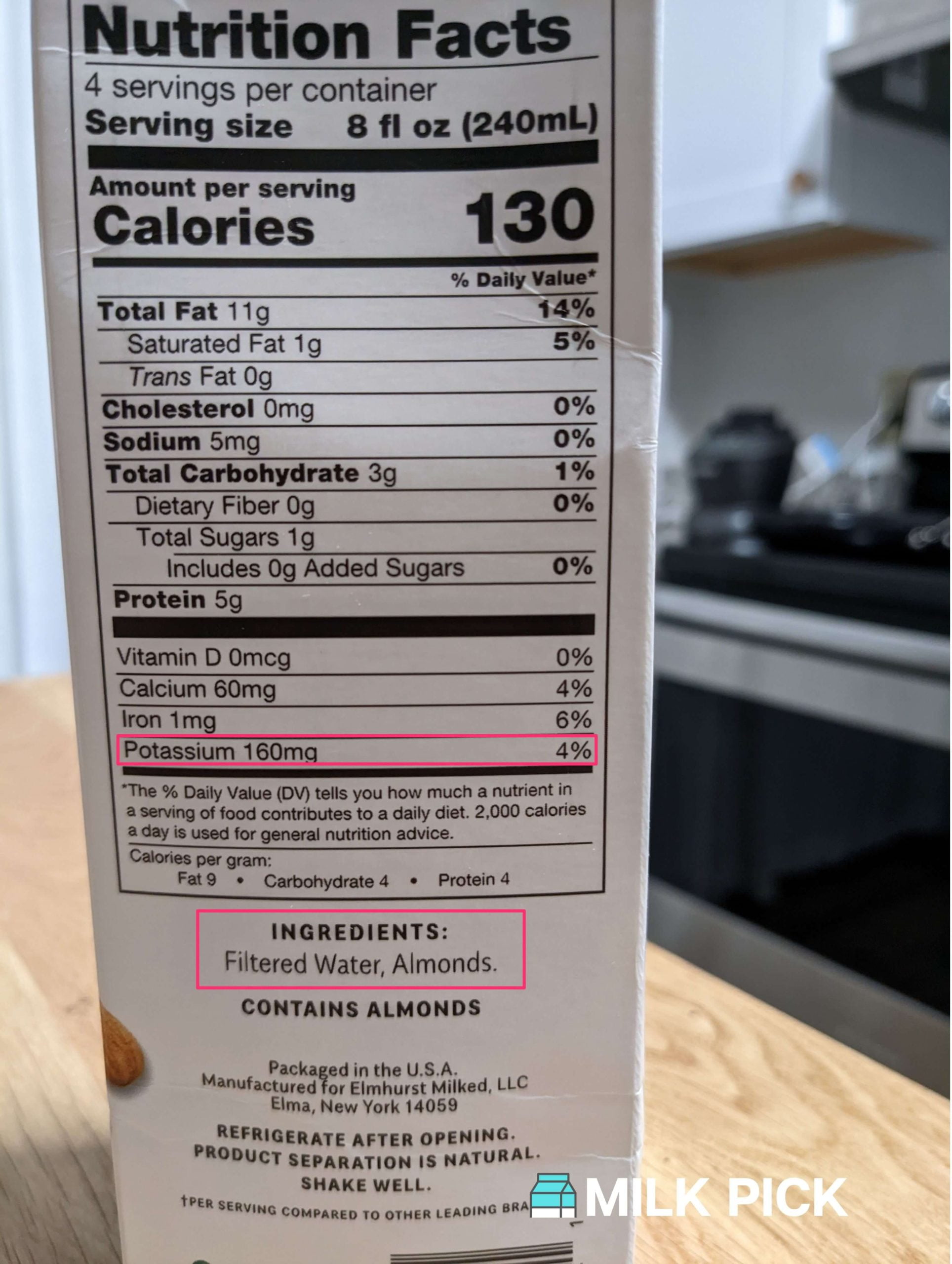
Most of the other popular almond milk brands that contain 100+ mg of potassium do it through fortification. They add ingredients like potassium citrate because they're primarily made of water and emulsifiers instead of almonds.
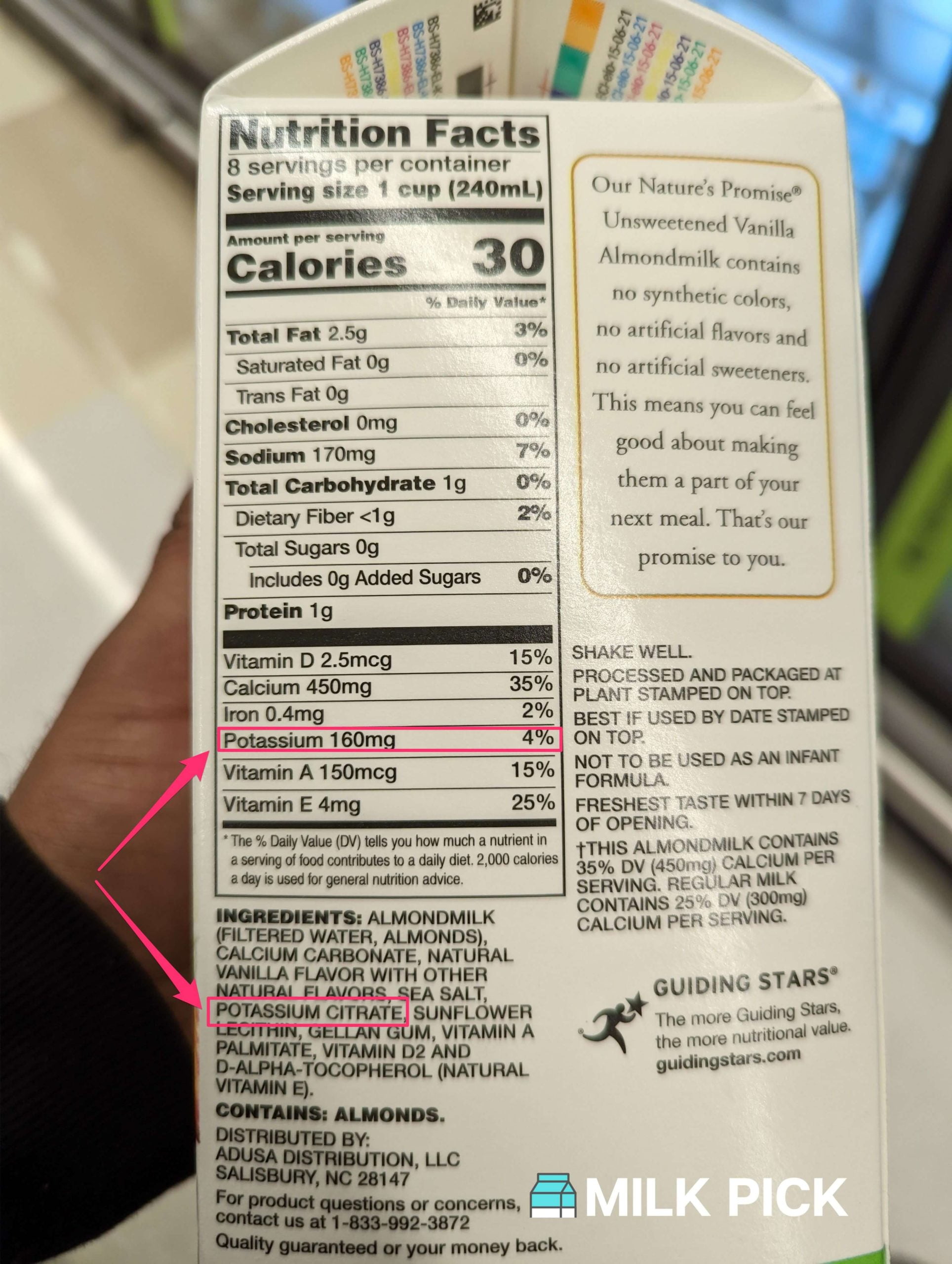
The FDA recommends that adults consume 4,700 milligrams of potassium each day. This means that a few glasses of almond milk won’t get you very close to your daily value.
Many of us are deficient in potassium. This can become problematic because it’s important to have this electrolyte balanced with the other electrolytes to stay well hydrated.
You may want to talk with your doctor about supplementing with potassium if you do not think you are getting enough through your diet.
Calcium and Almond Milk
The electrolyte that often goes undiscussed when it comes to hydration is calcium. But calcium is just as essential as sodium and potassium who tend to get more air time.
Calcium plays a large role in muscle contraction and nerve function. If you don’t have an adequate balance of calcium with water in your bloodstream, you can start to experience musculoskeletal or nervous system problems.
Almond milk is not naturally a rich source of calcium. However, many commercial almond milks come fortified with calcium.
An eight-ounce glass of fortified almond milk can have as much as 428 milligrams of calcium. The FDA recommends getting 1,300 milligrams of calcium daily.
This means consuming a few glass of almond milk each day will get you close to your daily value. When it comes to keeping your body hydrated and balanced with calcium, fortified almond milk may be a great choice.
Most almond milk with high levels of calcium tend to be filled with other potentially harmful additives. We recommend avoiding those.
If you're looking for plant-based milk with high-levels of calcium and minimal filler, take a look at our guide: Which Plant-Based Milk Has The Most Calcium
Exercise, Hydration, and Almond Milk
So far we’ve been discussing hydration and almond milk in relation to keeping you hydrated for day to day activities. When it comes to exercise, the way you hydrate becomes even more important.
It’s generally recommended that you consume about eight to twelve ounces of water for each 15 minutes of exercise.
And if you’re doing sustained aerobic exercise, it’s recommended that you get somewhere between 500 to 700 milligrams of sodium per hour of exercise.
Check out this video from Andrew Huberman to learn more about the link between sodium and exercise.
While a glass of almond milk may be an okay option as it is high in water, it’s probably doesn’t contain enough sodium.
And if you’re doing high level aerobic activity, you need enough sodium to prevent hyponatremia.
Hyponatremia is when your salt levels go low secondary to dehydration from insufficient salt intake. If you experience hyponatremia, especially while exercising, it could become a medical emergency.
This is why almond milk may be a good post workout hydration beverage, but it’s probably not an ideal hydration beverage while you are exercising.
Almond Milk vs Electrolyte Drink
A big question you might have is whether almond milk is just as good as an electrolyte drink when it comes to hydration. And the answer is it depends on the electrolyte drink.
While almond milk has lots of water and a few of the key electrolytes for hydration, it doesn’t have all the electrolytes involved in hydration.
It also isn’t necessarily an electrolyte rich beverage as the amount of the electrolytes that are present in it are relatively small.
But unlike many other electrolyte drinks, almond milk that is unsweetened is low in sugar. This may make it a healthier option for helping promote hydration.
But if you’re looking to get the full spectrum of electrolytes to promote total hydration, an electrolyte beverage is likely a better option. This is especially true if you are using it during sustained exercise to avoid cramps.
Stay Hydrated With Almond Milk
Almond milk is a fairly hydrating beverage as it’s primarily water and has several key electrolytes. These key electrolytes in almond milk are sodium, potassium, and calcium.
It’s most important that you get enough water each day and almond milk may help you achieve this goal. However, you also need to get enough of those key electrolytes to maintain and absorb the water.
Sodium, potassium, and calcium will help your body maintain water and keep your bodily functions normal. Fortified almond milk will contain all three of these electrolytes to help keep you hydrated.
While almond milk may be a good option for day to day hydration, it’s not the best choice when it comes to exercise. It does not contain enough salt or other electrolytes. This is why you may want to opt for an electrolyte drink over almond milk.
Now you are a fully equipped hydration expert. With all this information, you can decide if almond milk is the right choice for your hydration needs.
